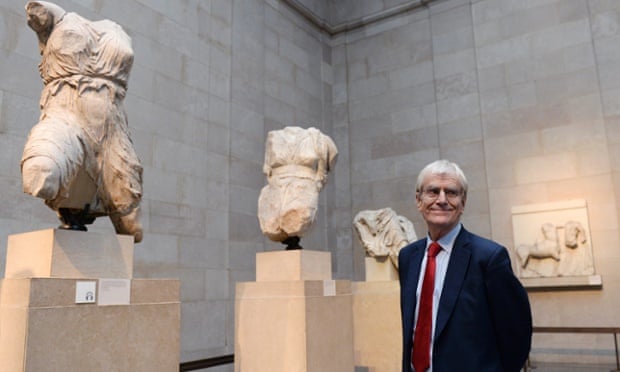Parthenon marbles: Greece furious over British loan to Russia
Greek prime minister says loan of statue from pillaged frieze puts end to British Museum argument that disputed antiquities are immovable
 Visitors look at the marble sculpture of the river god Ilissos, from the Parthenon marbles, at the Hermitage in St Petersburg, Russia. Photograph: Dmitry Lovetsky/AP
Visitors look at the marble sculpture of the river god Ilissos, from the Parthenon marbles, at the Hermitage in St Petersburg, Russia. Photograph: Dmitry Lovetsky/APHelena Smith in Athens
Friday 5 December 2014 15.38 GMT
Greece has reacted with outrage to the British Museum’s surprise move to loan one of the disputed Parthenon marbles to Russia.
Within hours of learning of the unexpected decision to send the monumental statue of the river god Ilissos to the State Hermitage museum in St Petersburg, the Greek prime minister, Antonis Samaris, hit back.
“[It] provokes the Greek people,” he said on Friday, insisting that the loan effectively ended the British Museum’s argument that the Greek antiquities were immovable.
“The last British dogma about immovability has ceased to exist … the Parthenon and its sculptures were the object of pillage. We Greeks are identified with our history and culture which cannot be torn apart, loaned and ceded.”
News of the move elicited shock and fury with Greek officials, and activists abroad, describing the gesture, variously, as sly, arrogant, provocative and rude. Campaigners suggested it would give added impetus to Athens to pursue the legal route in its quest to reclaim the Golden Age treasures from London.
Samaras’ conservative-dominated coalition is currently seeking advice from the human rights lawyer Amal Clooney, and two of Britain’s leading experts in cultural restitution, Geoffrey Robertson and Norman Palmer, in the fight to repatriate antiquities seen as the high point of classical art.
“[The loan is] appalling, no one had any idea whatsoever,” said Elena Korka, a senior culture ministry policymaker involved in restitution efforts since 1986. “For so many years they have argued that the sculptures could not be moved. At the end of the day this will turn against them,” she told the Guardian.
Veiled in secrecy until its announcement late on Thursday, the unprecedented step saw the collection being broken up for the first time since the British Museum took possession of the 5th century BC masterpieces in 1816. Roughly half of the 160-metre-long frieze has been in London since Thomas Bruce, the 7th Earl of Elgin, oversaw its removal from the Parthenon as the British ambassador to the Ottoman empire more than 200 years ago.

ebookTwitterPinterestexpandSir Richard Lambert, chairman of the British Museum Trustees, poses next to the Parthenon marbles in the British Museum, London. Photograph: Facundo Arrizabalaga/EPA
Neil MacGregor, the British Museum’s director, said the loan would reinforce the argument that the museum was a universal institution with global outreach.
The headless river god, among the most recognisable of the classical carvings, is due to be unveiled at the Hermitage on Friday in celebration of its 250th anniversary.
Speaking to BBC Radio 4’s Today programme on Friday morning, MacGregor said he hoped the Greek government would be delighted that the sculpture would now be on display to a new audience.
“I hope that they will be very pleased that a huge new public can engage with the great achievements of ancient Greece. People who will never be able to come to Athens or London will now, here in Russia, understand something of those great achievements in Greek civilization.”
But Greek officials said if they were to be delighted it would be “for other reasons”.
With a purpose-built museum constructed at the foot of the Acropolis to exhibit the sculptures, the move not only boosted the argument that the marbles should be “reunited” for ethical, aesthetic and scholarly reasons, but provided the first glimmer of hope that, one day, they would return to the place where they were created.
“It’s a change of attitude,” Korka said. “Now that they have taken this decision, they can pack up the rest and bring them here where the climate suits them and where they belong. And when the [two-month] exhibition at the Hermitage is over they can bring the Ilissos over too.”
She rejected the British Museum’s claim that Greece had consistently refused to enter into talks over loaning the antiquities to Athens. “We have never said ‘never’ to anything. We have said, so many times, we are open to mediation and that means we are open to loans as well.”
Macgregor repeated the museum’s claim on Friday, saying: “The Greek government has always refused to borrow, to date, but the trustees’ position is very clear that they will consider any request from anyone who is prepared to return the object.”
Discussions with the Hermitage are believed to have begun in October before the deal was sealed two weeks ago.
Campaigners for the return of the marbles to Athens said the loan was all the more inflammatory for its timing. In July 2013, Greece called on Unesco, the United Nations’ cultural organisation, to intervene, urging David Cameron’s government to participate in mediation in an attempt to settle the long-dispute. London has yet to respond.
“It is not just rude, provocative and arrogant, it is a highly offensive thing to do when Britain has completely ignored a Greek request to mediate this issue through Unesco,” said David Hill, the Australian president of the International Association for the Reunification of the Parthenon Sculptures. “For the best part of 18 months Unesco has been waiting for a reply,” he told the Guardian from Sydney. “The only thing this will do is aggravate the situation. It’s extremely inflammatory.”
沒有留言:
張貼留言